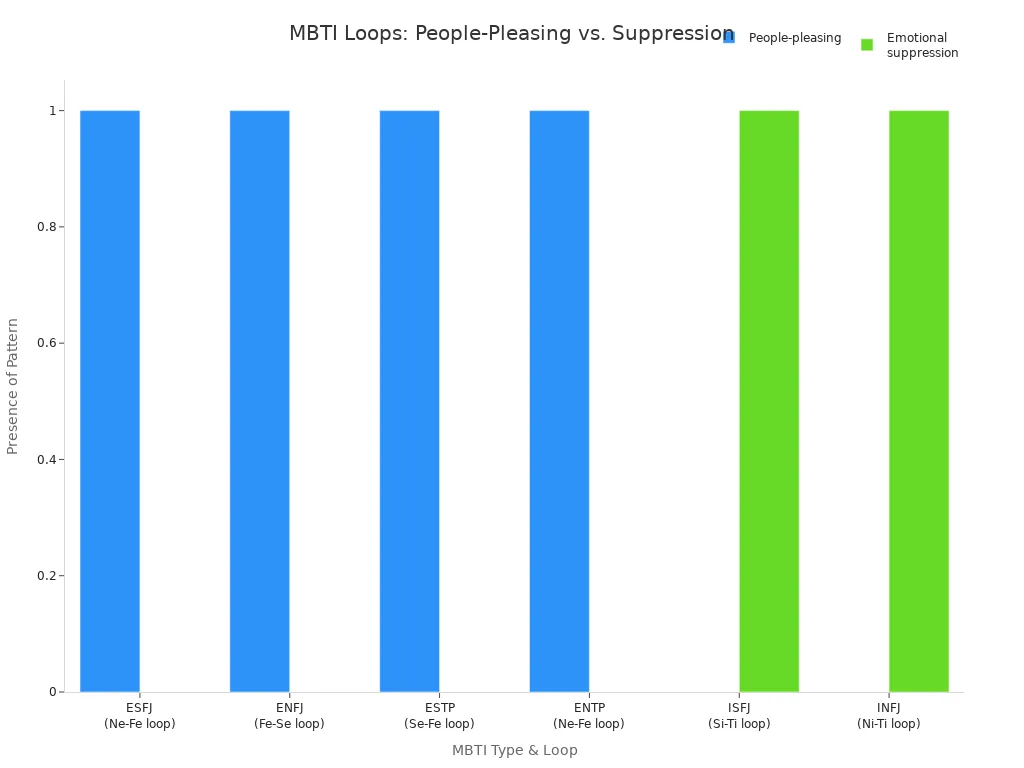The Hidden Link Between MBTI Nice Guy Traits and Losing Temper

Have you ever felt like the MBTI nice guy who always says yes? Inside, you might feel worried or even upset. When you hide your true feelings to make others happy, it costs you something.
| Emotional Cost | Description |
|---|---|
| Anxiety | Worry comes from trying to please everyone. |
| Resentment | Bad feelings come from not getting your needs met. |
| Emotional exhaustion | You feel tired after always pleasing people. |
You might get really mad when people push your limits, even if you try to stay calm.
Key Takeaways
- MBTI nice guys often keep their real feelings inside to make others happy. This can cause stress, worry, and sudden anger. - Fear of being left alone makes people hide their feelings. But this can make them feel tired, upset, and not close to themselves. - Making clear rules and sharing feelings in a calm way helps stop trying too hard to please others. It also makes relationships better.
MBTI Nice Guy Traits

Common Traits
When you think of the MBTI nice guy, you might see someone who wants everyone to get along. You want people to be happy, so you agree even when you do not want to. You might keep your real feelings hidden because you worry about making others upset. This can feel safe at first, but it often brings stress and frustration later.
Here are some common traits you might see in yourself or others:
- You care more about others’ needs than your own.
- You stay away from fights, even if you feel bad.
- You feel bad when you say no to someone.
- You try to solve everyone’s problems.
- You hide anger or sadness to keep things peaceful.
Note: These habits can make you look easy to get along with, but they can also build up stress inside. If you keep your feelings hidden, you might feel like you could explode one day.
MBTI Types and Behaviors
Different MBTI types show nice guy traits in their own ways. Let’s see how some types act when they want to please others or hide feelings.
| MBTI Type | How Loyalty Shows Up | How Empathy Shows Up | People-Pleasing & Emotional Suppression |
|---|---|---|---|
| ESFJ | Remembers birthdays, checks on friends, keeps peace | Notices when someone feels left out, offers help | Tries to please everyone, feels stressed if others are upset, hides own needs |
| INFJ | Builds close friendships, stays loyal | Listens well, understands feelings, gives advice | Hides emotions, avoids sharing pain, may use unhealthy habits |
| ISFJ | Always helps, remembers what matters to others | Senses moods, comforts quietly | Pulls away when upset, waits to talk about feelings, feels frustrated |
| INFP | Gives up own time for friends, stands up for causes | Feels deeply, wants to help others heal | Has trouble setting limits, gets tired from helping |
| ESTJ | Takes charge, protects loved ones | Shows care by doing things | Feels bad for saying no, hides feelings, may pull away |
| ESTP | Helps quickly, likes to fix problems | Reads the room, cheers people up | Tries to fit in, ignores own needs, feels restless |
| INTJ | Loyal to close friends, gives honest advice | Understands others’ goals, helps plan | Keeps feelings private, avoids talking about emotions |
| INTP | Loyal to a few close friends | Offers logical help, listens to problems | Bottles up feelings, avoids emotional talks |
You might see yourself in one or more of these types. For example, if you are an INFJ, you might try so hard to please others that you feel anxious or even sick. One INFJ said that people-pleasing brought anxiety, pain, and hidden feelings. This shows how the MBTI nice guy can have inner struggles and even hurt themselves.
Look at this chart. It shows how people-pleasing and hiding feelings in different MBTI types can lead to frustration:

You might see that types like ESFJ, ISFJ, and INFJ feel the most pressure to keep everyone happy. They use empathy and loyalty to help others, but sometimes forget about themselves. When you keep feelings inside, you might start to feel angry or upset. This is how the MBTI nice guy can lose their temper, even if you try to stay calm.
- Introverted types like INFJ and ISFJ often hide feelings to avoid bothering others. This can make you pull away and feel alone.
- People-pleasing can make you act against your own values, which brings stress and frustration.
- If you do not talk about your feelings, you might pull away from friends and family.
If you notice these patterns in yourself, you are not alone. Many people with MBTI nice guy traits have the same struggles. The good news is you can learn to spot these habits and start to change.
Fear of Abandonment

Emotional Suppression
You might notice that you hide your feelings when you worry about being left out or abandoned. This fear often starts early in life, especially if you had caregivers who were not always there for you. When you feel unsure about your relationships, you may try to keep everyone happy so they will not leave you. This is common for people with anxious attachment styles.
- Fear of abandonment often comes from insecure attachment, which means you did not always feel safe or loved as a child.
- You might use emotional suppression as a way to cope with the fear of losing someone important.
- If you have experienced trauma or emotional neglect, you may find it even harder to trust others.
- Some people, especially those with Borderline Personality Disorder (BPD) or similar traits, feel this fear very strongly.
- Your brain can become extra sensitive to signs that someone might leave, making you want to hide your true feelings to avoid getting hurt.
When you push down your feelings, you might think you are protecting yourself. You do not want to seem needy or upset, so you keep quiet. Over time, this can make you feel numb or disconnected from your own needs. You may even start to lose touch with who you really are.
Tip: Emotional suppression might feel safe at first, but it can lead to bigger problems like anxiety, depression, and even physical health issues. You deserve to express your feelings and have your needs met.
If you keep hiding your emotions, you might notice these long-term effects:
- You may feel anxious, sad, or numb.
- Your body can get stressed, leading to health problems.
- Relationships might suffer because you do not share your true self.
- You could lose sight of your own needs and dreams.
- You might feel tired, resentful, or even angry without knowing why.
Triggers for Losing Temper
When you try so hard to be the MBTI nice guy, you may ignore your own needs to keep others close. But the fear of being left behind can build up inside you. If you keep your feelings hidden, they do not go away—they just wait for a trigger.
Some common triggers for losing your temper include:
- Feeling like someone is about to leave you, even if it is just for a short time.
- Sensing rejection or thinking someone does not care about you.
- Noticing that someone is ignoring you or not giving you enough attention.
- Facing changes or losing routines that make you feel safe.
- Hearing your own inner voice say you are not good enough or lovable.
These triggers can make you react much more strongly than you expect. You might feel a sudden rush of anger or panic. Sometimes, even a small thing can set you off if you have been holding in your feelings for too long.
Note: People with a strong fear of abandonment often try very hard to avoid being alone. You might do things like over-apologize, say yes when you want to say no, or try to fix every problem for others. This can make you feel exhausted and disconnected from yourself.
If you keep suppressing your emotions, you may notice these patterns:
- You feel burned out from always pleasing others.
- You get angry or resentful when your needs are not met.
- You have trouble setting boundaries and saying what you really want.
- You depend on others to feel good about yourself.
- You feel anxious or sad when you think someone might leave.
Some MBTI types, especially those who are more sensitive or introverted, may feel these triggers more deeply. If you are an INFJ, ISFJ, or INFP, you might notice that you take things to heart and worry a lot about losing people. Outgoing types may handle these feelings differently, but everyone can struggle with fear of abandonment in their own way.
Remember: You are not alone in feeling this way. Many people struggle with these fears, but you can learn to recognize your triggers and start expressing your feelings in healthier ways.
Breaking the Cycle
Assertiveness and Boundaries
You might think being assertive means acting aggressive, but that’s not true. Assertiveness is about sharing your needs and feelings in a clear and respectful way. You can stay kind and still stand up for yourself. Many people with nice guy traits worry that setting boundaries will upset others or make them seem selfish. In reality, boundaries help you protect your energy and keep your relationships healthy.
Here are some steps you can try to build assertiveness and set boundaries:
- Notice your beliefs about being assertive. Ask yourself if you think it’s wrong to say what you want.
- Practice saying “no” in small, safe situations. This helps you build confidence.
- Use “I” statements, like “I feel tired and need some time alone,” instead of blaming others.
- Remember, your feelings matter just as much as anyone else’s.
- Start with small boundaries, like asking for quiet time or saying you can’t help right now.
Tip: Boundaries act like a shield. They keep your emotions safe and stop you from taking on everyone else’s feelings. When you set boundaries, you feel less overwhelmed and more in control.
Healthy Expression
You don’t have to hide your feelings to keep the peace. Healthy emotional expression helps you avoid bottling up anger or sadness. Try these ideas to express yourself in a better way:
- Reframe negative thoughts. Instead of thinking, “I always mess up,” try, “I can learn from this.”
- Practice mindfulness. Take a few deep breaths when you feel upset.
- Take a break if you feel your temper rising. Step away and cool down before you respond.
- Share your feelings calmly. Use simple words to say how you feel and what you need.
- Solve problems together. Talk with others about what works for both of you.
Self-reflection helps you notice your feelings and why you react the way you do. When you understand yourself, you can choose better ways to handle tough moments. Over time, these habits make your relationships stronger and help you feel more like yourself.
You can see how MBTI nice guy traits and fear of abandonment connect to losing your temper. Check the table below to spot your patterns. Try these steps to change:
| MBTI Type | Anger Pattern |
|---|---|
| ESFJ | Withdraws, self-critical |
| ISFJ | Bottles anger, anxious |
| INFJ | Intense venting, remorse |
| ENTJ | Lashes out, shame |
| ESTJ | Yells, frustration |
- Notice when you people-please.
- Set boundaries.
- Express your needs.
- Practice self-care.
Start small. Healthier self-expression leads to better relationships.
FAQ
Why do you lose your temper after being nice for so long?
You hold in your feelings to keep others happy. Over time, those feelings build up. One small thing can make you snap.
Tip: Let your feelings out early. It helps!
Can you stop people-pleasing if it feels automatic?
Yes! You can practice saying “no” and set small boundaries. Start with easy situations. You will get better with time.
Which MBTI types struggle most with emotional suppression?
ISFJ, INFJ, and ESFJ types often hide their feelings. You might do this to avoid conflict or keep peace, but it can cause stress.
